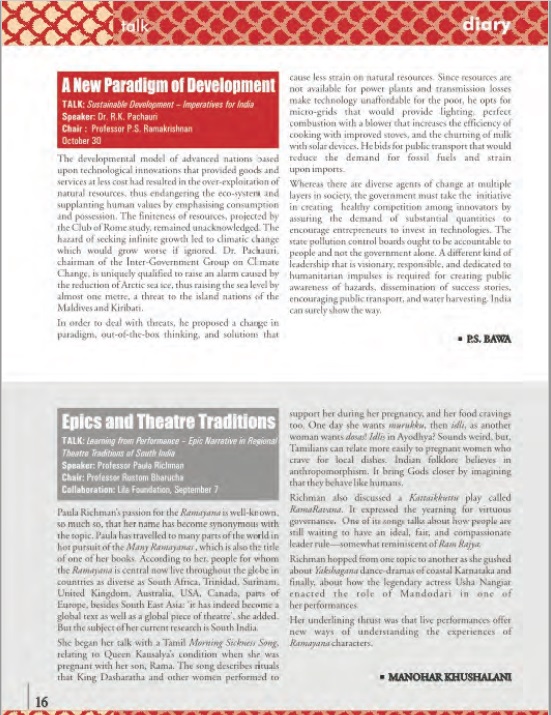Epic Narrative in Regional Theatre Traditions of South India | Manohar Khushalani
Paula Richman, Danforth Professor of South Asian Religions at Oberlin
College in Ohio, USA, gave a talk on Learning from Performance using Epic
Narrative in Regional Theatre Traditions of South India. Supporting her as
the moderator was Prof. Rustom Bharucha, from the School of Arts and
Aesthetics, JNU, where Paula is also doing a short term Fellowship.
Richman’s passion for Ramayana is well known, so much so, that her name
has become synonymous with the topic. Paula has travelled to many parts of
the world in hot pursuit of the ‘Many Ramayanas ‘, which is also the title of
one of her books. According to her, people for whom Ramayana is central
now live throughout the globe in countries as diverse as South Africa,
Trinidad, Surinam United Kingdom, Australia, USA, Canada, parts of Europe,
besides South East Asia, “it has indeed become a global text as well as a
global piece of theatre” she added. But the subject of her current research
was South India.
She began her talk with a Tamil ‘Morning Sickness Song’, relating to Queen
Kausalya’s condition when she was pregnant with her son Rama. The song
describes rituals that King Dasharatha and other women performed to
support her during her pregnancy, and her food cravings too. One day she
wants murukku, then idli, as another woman wants dosas! Idlis in Ayodhya?
Sounds weird, but, Tamilians can relate more easily to pregnant women who
crave for local dishes. Indian folklore believes in anthropomorphism. It bring
Gods closer by imagining that they behave like humans.
Paula also discussed a Kattaikkuttu play called RamaRavana. It expressed
the yearning for virtuous governance. One of its songs talks about how
people are still waiting to have an ideal, fair, and compassionate leader rule
– somewhat reminiscent of Ram Rajya.
Richman hopped from one topic to another as she gushed about Yakshagana
dance-dramas of coastal Karnataka and finally, about how the legendary
actress Usha Nangiar enacted the role of Mandodari in one of her
performances.
Her underlining thrust was that live performances offer new ways of
understanding the experiences of Ramayana characters.

